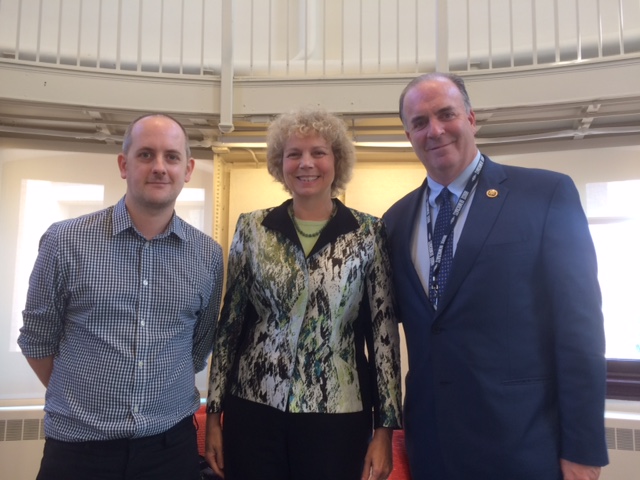 On Wednesday, July 27th, the CEET supported the Fels Policy Research Initiative by providing science expertise and a research perspective for their interactive panel discussion on Lead and environmental policy. The panelists contributing to this discussion were our COEC Director Dr. Marilyn Howarth, environmental journalist for The Guardian Oliver Milman, and Michigan Congressman Dan Kildee. The discussion ranged from the policy decisions made in Flint, Michigan that preceded and triggered the lead poisoning of thousands of children and adults living in Flint through exposure to lead in drinking water, the influence of environmental injustice on the government’s response to the Flint Water Crisis, to strategies for investment in infrastructure to replace lead service lines across the United States. Panelists agreed that policies must be put in place to ensure that all citizens know if they have lead service lines. Some individuals and some municipalities would use this information to identify local strategies to prevent lead exposure like using filters on drinking water lines and planning for the systematic replacement of lead service lines. Oliver Milman described investigative reporting that identified that many US cities used water testing methods that were not in compliance with EPA standards and would tend to lower the lead levels found. Congressman Kildee has introduced legislation that would decrease the action level for lead in water to 5 ppb because he noted that the current action level for lead in water, 15ppb, is not identifying problems in water systems when they exist. This hampers government agencies from taking any action. Dr. Howarth noted that the action level is not a health based standard. In other words, it has not been proven to protect public health. The Centers for Disease Control and Prevention has noted that even lead levels in water of 20ppb can raise a small child’s blood lead level into the dangerous range over 5 mcg/dl. Dr. Howarth reaffirmed that there is no safe level of lead exposure for children and that preventative measures should be taken to limit lead exposure to children from water, lead based paint, lead in toys, and imported medications and candy. The panel agreed that an effective strategy for tackling lead exposure should be multi-faceted and that it was important for public health to design strategies that are universally applicable. For more information on lead and how you can protect yourself and children from lead exposure, please download our lead brochure.
On Wednesday, July 27th, the CEET supported the Fels Policy Research Initiative by providing science expertise and a research perspective for their interactive panel discussion on Lead and environmental policy. The panelists contributing to this discussion were our COEC Director Dr. Marilyn Howarth, environmental journalist for The Guardian Oliver Milman, and Michigan Congressman Dan Kildee. The discussion ranged from the policy decisions made in Flint, Michigan that preceded and triggered the lead poisoning of thousands of children and adults living in Flint through exposure to lead in drinking water, the influence of environmental injustice on the government’s response to the Flint Water Crisis, to strategies for investment in infrastructure to replace lead service lines across the United States. Panelists agreed that policies must be put in place to ensure that all citizens know if they have lead service lines. Some individuals and some municipalities would use this information to identify local strategies to prevent lead exposure like using filters on drinking water lines and planning for the systematic replacement of lead service lines. Oliver Milman described investigative reporting that identified that many US cities used water testing methods that were not in compliance with EPA standards and would tend to lower the lead levels found. Congressman Kildee has introduced legislation that would decrease the action level for lead in water to 5 ppb because he noted that the current action level for lead in water, 15ppb, is not identifying problems in water systems when they exist. This hampers government agencies from taking any action. Dr. Howarth noted that the action level is not a health based standard. In other words, it has not been proven to protect public health. The Centers for Disease Control and Prevention has noted that even lead levels in water of 20ppb can raise a small child’s blood lead level into the dangerous range over 5 mcg/dl. Dr. Howarth reaffirmed that there is no safe level of lead exposure for children and that preventative measures should be taken to limit lead exposure to children from water, lead based paint, lead in toys, and imported medications and candy. The panel agreed that an effective strategy for tackling lead exposure should be multi-faceted and that it was important for public health to design strategies that are universally applicable. For more information on lead and how you can protect yourself and children from lead exposure, please download our lead brochure.
Aug
02
COEC Director Participates in Lead and Environmental Policy Panel Discussion
Posted by Community Engagement Core

© The Trustees of the University of Pennsylvania | University of Pennsylvania | Perelman School of Medicine



